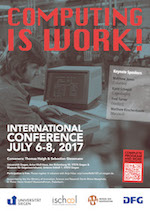Computing is Work
June 21, 2017 #research #media
On July 6-8, the Universität Siegen is hosting an international conference on computing and work organized by Thomas Haigh & Sebastian Gießmann. The idea behind the conference is that “close attention to the social processes of work has the cross-cutting potential to integrate a variety of historical, social and ethnographic research approaches, from labor history to the scientific ethnography to the study of media practice…”
The list of participants and keynote speakers is impressive. I will be speaking on documentation as computer work, and specifically on flowcharts as temporal boundary objects.
Champion of Inclusion
May 26, 2017 #teaching
I am very honored to have been selected for a 2017 Champion of Inclusion award by the School of Informatics and Computing as part of its M.O.S.A.I.C. (Multicultural Outstanding Achievements in Computing) program. Computing as a whole has a long way to go in terms of inclusion and diversity, but one of the many reasons why I love the Informatics program at IU is its record of action and leadership in this area.
Dr. Richard Knepper, PhD
April 25, 2017 #teaching
Richard Knepper, one of the PhD students that I advise, successfully defended his dissertation today. The title is “Shifting Modalities of Use in the XSEDE Project.” Congratulations, Dr. Knepper!
The History of Women in Engineering
January 31, 2017 #teaching
This week in my graduate seminar on Technology & Gender, we will be discussing Ruth Oldenziel’s Making Technology Masculine: Men, Women and Modern Machines in America, 1870-1945. As a complement to that discussion, we will be analyzing a remarkable set of primary source documents on the history of women in technology. The documents are a series of letters exchanged between the presidents of various engineering schools in the United States in the fall of 1917, and are part of one of my favorite stories about the importance of serendipitous discovery in historical research.
In the spring of 2005 I was a relatively new faculty member in the History & Sociology of Science department at the University of Pennsylvania, and had just finished teaching an undergraduate survey course on the history of technology. One of the topics we covered was the history of women in engineering.
A few weeks after the end of the semester one of my most excellent students, a Penn undergraduate named Joan Lee, came to my office with a collection of documents she had found in a dumpster. Joan was teaching in a summer program aimed a teaching girls and boys about science and technology, and went looking for some waste paper out of which to construct paper airplanes. What she found was a set of letters to and from John Frazer, the then dean of the Towne Scientific School at the University of Pennsylvania. In early November 1917, Frazer had written to the deans or presidents of all of major engineering or technical colleges in the United States, asking them about their policies on admitting women to their programs. The responses came from Stanford, Cornell, Dartmouth, Johns Hopkins, Wellesley, Berkeley, University of Michigan, University of Illinois, Washington University of St. Louis, Case Western, Brooklyn Polytechnic, Tulane, University of Virginia, Georgia Tech, and the Stevens Institute of Technology. The results are fascinating and, in some cases, surprising.
At the time, Penn was touting its (relatively) long and admirable history of admitting women. Sadly, the tragic conclusion of this chain of letters shows that this was not true of its engineering departments. But in any case, what a remarkable opportunity for a history of science student to experience, as an undergraduate, the challenges and pleasures of doing historical research.
You can find the document collection here. Be sure to read the final two letters, which bring the episode through to its sad conclusion in 1921. Then go read Oldenziel’s book, because although these letters provide excellent insight into what the Deans of engineering schools thought about the role of women in engineering at the turn of the 20th century, they are a terrible reflection of the actual presence of women in engineering in this period.
Technology and Gender
January 09, 2017 #teaching
For the spring 2017 semester I will be offering a new graduate seminar that explores the intersection of technology and gender. In part this will develop my long-term interest in the history of women in computing, but will also include the emerging literature on masculinity and computing and queer computing.
The syllabus for the course can be found here, but I have also made public a Github repository that includes an extensive bibliography. Feel free to clone or fork. I would like this to be maintained and extended to serve as a useful resource for other scholars and students working in this field.
In addition, you might find useful this list of women and gender non-conforming people writing about technology.
The Multiple Meanings of a Flowchart
July 31, 2016 #publications

From the very earliest days of electronic computing, flowcharts have been used to represent the conceptual structure of complex software systems. In much of the literature on software development, the flowchart serves as the central design document around which systems analysts, computer programmers, and end users communicate, negotiate, and represent complexity. And yet the meaning of any particular flowchart was often highly contested, and the apparent specificity of such design documents rarely reflected reality. Flowcharts were rarely “true, ” but they were nevertheless useful. In the latest issue of the journal Information & Culture, I explore the “Multiple Meanings of the Flowchart”.
For those of you without access to the Project Muse academic database, you can find an earlier draft version of the paper for free online here.

